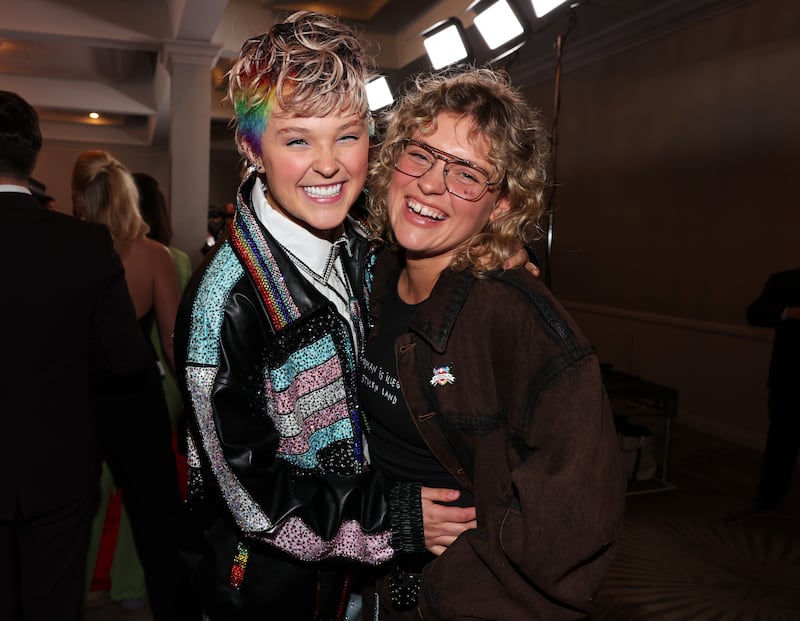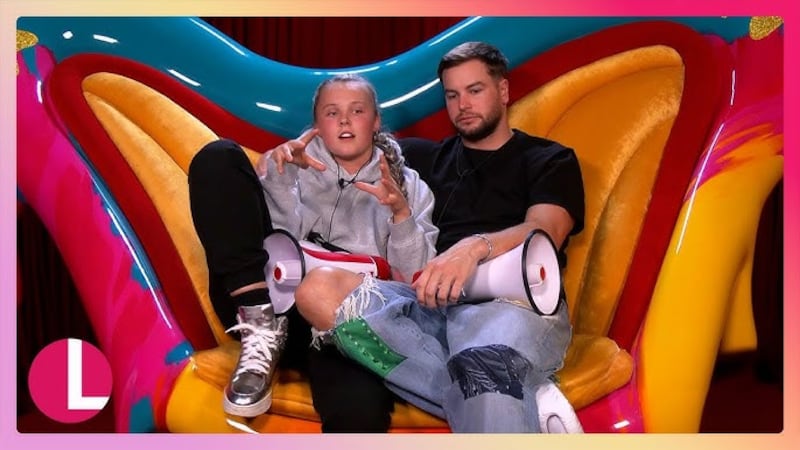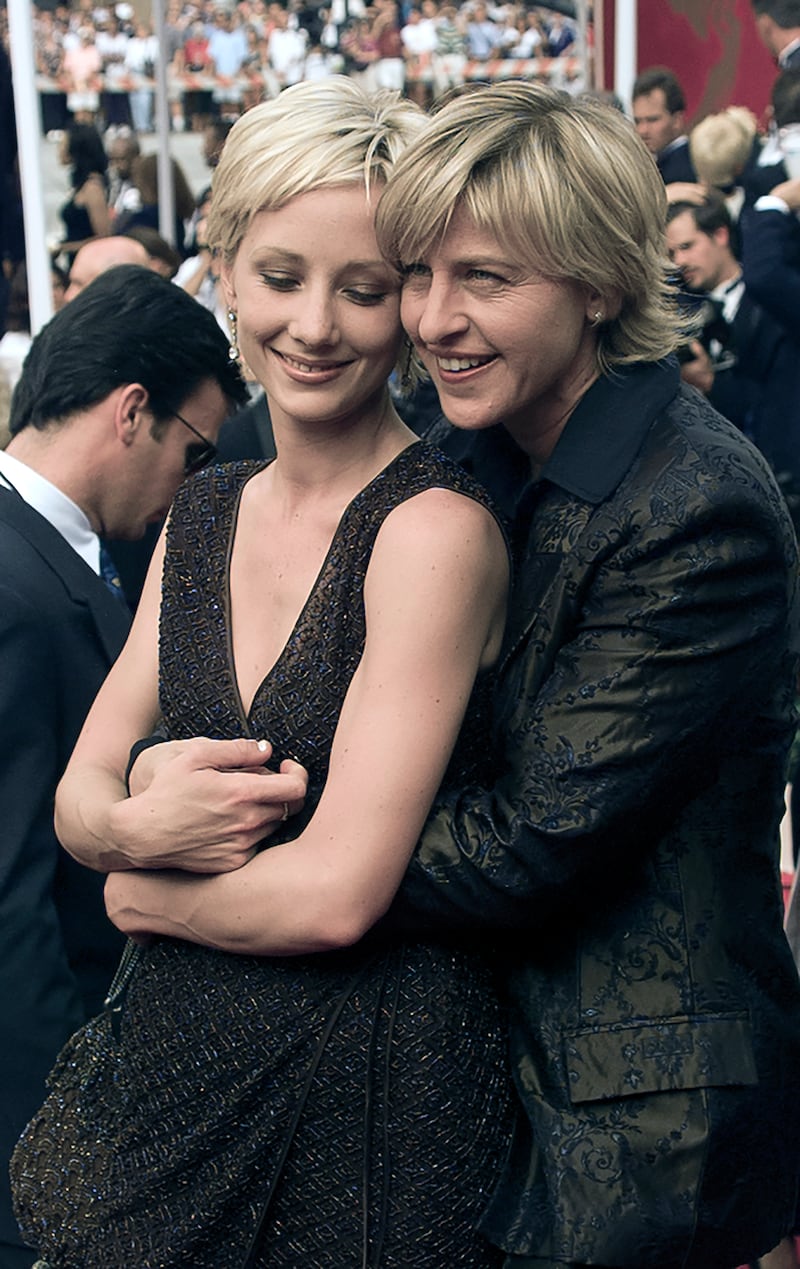Be bisexual on this earth long enough and you’ll hear just about everything.
My high school girlfriend was often asked by friends if she was dating me “for the threesomes.” When I came out to a guy I liked in college, he told me that my sexual orientation was a “hippie, new-age affectation.” I passingly referenced being bisexual in a Facebook status some years ago, and a casual acquaintance started accusing me of lying over DM. He believed that bisexuals exist, he clarified, but he didn’t think that I, specifically, was bi. I could not have blocked him fast enough.
If there’s any contemporary authority on the subject of projection, it’s certainly JoJo Siwa, a 22-year-old singer who is having a profoundly weird year, even by the standards of former child stars.
Siwa, who first came to attention on the TLC reality show Dance Moms, kicked off her 2025 by becoming the unwitting face of Hot Biphobic Summer: a grueling (and seemingly neverending) freakout in which queer celebs are treated as turncoats and traitors for the banal sin of following their hearts. The controversies are yet another unfortunate reminder for bisexuals that there is simply no way to exist in a way that satisfies people, no way to avoid others’ unwanted scrutiny or their implicit assumptions about your life.
As is the case with many of the world’s evils, the problem began with Celebrity Big Brother.
During her time on the U.K. edition’s 22nd season, fellow housemate Mickey Rourke—a former ’80s heartthrob turned 30 Rock cutaway joke—harassed Siwa because of her sexuality. After proclaiming to his castmates that he intended “to vote the lesbian out real quick,” Rourke vowed to practice conversion therapy by turning her straight: “If I stay longer than four days, you won’t be gay any more.” (While a member of the Big Brother house, Siwa was in a relationship with Kath Ebbs, who is nonbinary.)

Although Rourke was eventually ejected over the remarks, which included the use of a homophobic slur, Siwa’s time on the longrunning reality series indicated that she had an evolving view of her sexuality. Although she had alternatively described herself as pansexual and a lesbian at different times in her young life, Siwa confessed that she had come to identify as queer—an umbrella term recognizing the beautiful fluidity of the self.
The revelation was, in many ways, fairly unremarkable for someone in their early twenties: Siwa admitted that was still figuring herself out, trying on new hats to see which ones fit. What has drawn the most outsized attention, though, is Siwa’s current choice of chapeau.
After finishing Big Brother in third place, Siwa dumped Ebbs for her (male) housemate, Chris Hughes, a low-level British reality star not to be confused with the guy who co-founded Facebook. Much like a married CEO caught slipping at a Coldplay concert, their fraught love triangle is undoubtedly messy, but it’s not hard to grasp why things played out the way they did. Siwa found emotional support from a new friend amid a harrowing situation, and suddenly, there was something there that wasn’t there before, to invoke Beauty and the Beast.
For those even aware what a JoJo Siwa is, the popular response has largely fallen into two camps. The first feels proportionate: Her relationship with Hughes is incredibly cringy, but not for the identity politics involved. The two are just plain weird together, like a pair of malfunctioning Furbies playing tonsil hockey. Consider Hughes’ recent divulgence that the nascent couple has named each other’s downstairs areas, a piece of information that we certainly did not ever need to know. (Personally, I was doing just fine without it!)
The second, more egregious, strain of responses reeks of old-school biphobia—a hysteria that will be extremely familiar to everyone whose sexuality exists outside rigid binaries.

Right-wing writer (and noted plagiarist) Benny Johnson opined on X that Siwa had rebranded “from a radical lesbian activist to a straight, trad-girlfriend” after she released an unrequested, ear-splitting cover of Kim Carnes’ synthpop standard “Bette Davis Eyes.”
Siwa wore a blue ruffled dress as a tribute to the Golden Age of Hollywood icon in an accompanying TikTok video, one which a viral tweet cited as a “perfect example of the rise in conservatism.” But if I may posit, the anachronistic Cinderella getup speaks less to her political leanings than sheer cinematic ignorance: There’s a less than zero percent chance Siwa has ever seen Dark Victory (in which the divine Ms. Davis suffers from a brain tumor, but glamorously).
In being accused of turning straight simply because she dated one (1) man, Siwa is certainly not alone. When queer musicians Billie Eilish and Fletcher entered into opposite-sex romances this year, the hostile internet backlash was summed up by a headline in Interview magazine: “Why Are All the Lesbian Celebrities Straight Now?”
Neither artist, at the time of publication, has referred to themselves as a lesbian. In a December 2023 post on Instagram, Eilish wrote that she likes “boys and girls.” Fletcher, meanwhile, has eschewed labeling altogether. “Sexuality and gender is not black and white,” she said in a 2017 interview with Billboard. “It’s a spectrum that we all fall somewhere in the world on. That’s how I feel comfortable expressing myself—loving who I feel like loving and who I’m attracted to.”
Bisexuals are the largest segment of the queer community—making up 56 percent of all LGBTQ+ Americans, according to Gallup—and yet others’ willful misunderstanding of us renders us virtually invisible. When we are not treated as greedy and depraved, we are indecisive, as if we can’t make up our minds and haven’t made a choice yet. Our sexuality is simply a phase, transitory.
On the original run of Sex and the City, years before the case of Schrödinger’s twice-deceased father, Carrie Bradshaw once opined: “I’m not even sure that bisexuality exists. I think it’s just a layover on the way to Gaytown.” Following her 2010 wedding to co-star Stephen Moyer, the late Larry King asked True Blood’s Anna Paquin if she was a “nonpracticing bisexual.”
The stigma that bisexual people face, even semi-ridiculous reality stars, has real costs. The prevailing research indicates that bisexuals have among the worst mental health outcomes of any demographic of the LGBTQ+ community, experiencing elevated rates of depression, anxiety, social isolation, and suicidal ideation. A 2019 Pew Research report found that bisexuals were six times more likely to be in the closet than other LGBTQ+ people and less likely to have support from those around us—which is particularly true for bisexual men.
Bi people who dare to be out, and to live life on their own terms, too often pay the price for their own visibility. After breaking out in the mid-90s as a supporting player in prestige films like Wag the Dog, Anne Heche was briefly part of the world’s most famous queer couple: announcing her relationship with comedian Ellen Degeneres in 1997. When the two broke up three years later, Heche married a man (gasp!): the improbably named Coley Laffoon, to whom she would remain wed from 2001 to 2008.

The public’s reaction to Heche’s choice in partner was hostile, bordering on hysteric. An ABC News article proclaimed that Heche had “given up her woman-lovin’ ways and returned to the ranks of heterosexuality,” while the New York Daily News alleged that the straight pivot was a nothing more than a cynical career move. When she moved on from Laffoon to her Men in Trees co-star James Tupper, I still remember a prominent entertainment news show claiming that Heche had “gone back to men.” The assertion was both biphobic and weirdly redundant: By their cracked logic, hadn’t she already?
Heche passed away in a tragic car accident three years ago, following a prolonged mental health struggle that made her a late-night talk show punchline. It’s difficult to say what role the mistreatment of her played in her downfall, but it surely didn’t help. I’ve always wondered how Heche’s life might have been different had she been afforded some grace, or even the space to be a little chaotic.
Every bisexual person should be permitted the opportunity to be queer in the precise way they wish to be, whether or not others approve of our personal and romantic choices. I’ve always admired Heche’s tenacity through the turmoil—her 2001 memoir, notably, was entitled Call Me Crazy—and I hope that Siwa demonstrates that same fiery resilience.
Bi people shouldn’t have to be resilient just to take up space and yet we are often given no choice but to be defiant. Every time in my life that someone has told me they know more about who I am than I do, all it has done is make me more resolute in being myself. The alternative is unthinkable.
I wish for JoJo Siwa the audacity of choosing her own happiness. I sense that she is on a journey, and whenever she gets to where she’s going, however she defines her sexuality at the end of the path, I just hope that she’s OK. And that she finally watches a Bette Davis movie. Life is too precious not to have seen The Little Foxes.









